by Sammie Ann Wicks
Noticias Southwest Senior Correspondent
|
When South Carolina Republican Senator Sandy Senn (District 41) took the podium during a contentious legislative session in September and fixed a steely gaze on her male colleagues, they knew something was up.
"To those of you who feel that women are inferior, remember you were warned," Senn exhorted her fellow policymakers. "You don't think that women will vote single-issue on something like this? Because they will." |
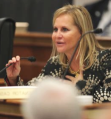 |
"To those of you who feel that women are inferior, remember you were warned" |
|
|
Senn's pointed remarks came during a Sept. 8 legislative session that saw Republican senators move to enact a harsh abortion ban that does not allow exceptions for rape and incest. But not all Republican members of the caucus were on board.
Senn's Republican colleague Sen.Tom Davis (District 46) ultimately threatened to filibuster the bill and said he'd come to oppose the bill in part for personal reasons.
"My daughter," he said, revealing he'd promised his daughters he wouldn't vote for the total restrictions proposed in the measure.
"The moment we become pregnant we lose all control over what goes on with our bodies," Davis declared. "I'm here to tell you I'm not going to let that happen." |
 |
"The moment we become pregnant
we lose control of our bodies" |
|
|
Senn, a lawyer and a Catholic representing an increasingly moderate district, also said she viewed the bill, and others like it, as an invasion of privacy.
"If what is going on in my vagina isn't an unreasonable invasion of privacy for this legislature to get involved in, I don't know what is," she said.
After supporters of the South Carolina ban failed to garner enough votes to stop Davis's threat to filibuster the more extreme bill, the legislation is now at an impasse.
And in a fresh development, South Carolina's Supreme Court on Oct. 19 began hearings to consider whether abortion statutes violate South Carolina's constitutional right to privacy, hearing arguments from state attorneys and Julie Murray, a staff attorney with the Planned Parenthood Federation of America.
Chief Justice Donald Beatty noted the high court's perusal of the issue will take time to complete, stressing the Court wanted to avoid any "distractions from this very serious argument."
The Court is expected to render a decision after the upcoming elections, but has not gjven a firm date for when that will occur.
Elsewhere, other conservative legislators were starting to question the wisdom of their own state's extreme positions on abortion issues after witnessing the public backlash protesting June's U.S. Supreme Court ruling against Roe v. Wade.
"We are not elected as kings or dictators," West Virginia Republican Sen.Tom Takubo (District 17) declared at a legislative session last July. "We're elected to serve the will of the people." The West Virginia Republican-backed abortion measure also contained no exceptions for rape or incest. |
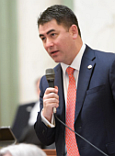 |
"We are not elected as kings or dictators--
We're elected to serve the will of the people"
|
|
|
"Even in the most rural and conservative parts of West Virginia, I still believe the majority thinks there should be exceptions for rape and incest," Takubo said. His Democratic colleague, Sen. Owens Brown (District 1), joined in opposing the bill and minced no words over what he thought of it.
"That's somewhat irrational . . . to be able to apply a law that will never apply to you," Brown said during the session, calling attention to the fact that his male colleagues were passing laws that affect only women.
"It's easy for you to sit there and do that," Brown charged, "because you will never have to face the consequences of your actions." |
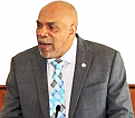 |
"It's irrational to apply a law (to others) that will never apply to you" |
|
|
Brown is the former president of the West Virginia NAACP and the first African-American to serve in the West Virginia Senate, appointed in 2021 by West Virginia Gov. Jim Justice to fill a vacant Senate seat.
Rep. Gil Gatch (District 94), another South Carolina Republican who has consistently advocated for a state abortion ban, said he still supports exceptions for rape and incest.
After the U.S. Supreme Court's 'Dobbs' ruling, Gatch said state legislators getting an abortion law's time-frame accurately stated is "much more difficult--it's scarier, to be honest. Because if we get the wrong thing done, it's on us."
Prior to her state's Senate debate of abortion exceptions, South Carolina Rep. Nancy Mace (District 99) supported a state abortion ban, but vigorously advocated for access to contraceptives.
Wearing a sign on her back that read, "My state is banning EXCEPTIONS. Protect CONTRACEPTION," Mace declared. "You can't ban abortion and not protect women's access to contraceptives."
Farther north, Pennsylvania Lt. Gov. John Fetterman, who is running for the U.S. Senate, put things more bluntly.
"Let me say that again: Women are the reason we can win," Fetterman exclaimed during a spirited campaign rally Sept.11. "Don't piss women off." |
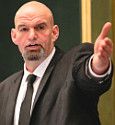 |
"Let me say that again: Don't piss women off" |
|
|
In other remarks, Fetterman claimed that, if elected, his Republican opponent, Mehmet Oz, would be a "rubber stamp" vote for a nationwide ban that would contain no exceptions for rape or incest.
But Oz's communications staffer Brittany Yanick in a recent media segment countered that “Dr. Oz supports exceptions for rape, incest, and the life of the mother."
(Update Nov. 15, 2022: Pennsylvania Lt. Gov. John Fetterman, in his run for U.S. Senate, defeated Republican challenger Mehmet Oz Nov. 8)
New Hampshire's current Republican candidate for U.S. Senate Don Bolduc, asked about his position on abortion access, said women should "Get Over It" during a forum by Mt. Washington Valley Economic Council over New Hampshire affiliate WMUR Oct.18.
Bolduc is running against Democratic Incumbent Maggie Hassan for the District 23 slot.
|
 |
"Abortion rights--Women: Get over it" |
|
|
The retired Army brigadier general and militarist is supported in his run by former President Donald Trump, has said during his campaign he wants to abolish the FBI and U.S. Department of Education, and has labelled fellow Republican New Hampshire Gov. Chris Sununu "a Chinese Communist sympathizer." It is widely believed among party faithful that he was not the GOP's first choice to run against Hassan.
During the forum Bolduc declared his support for some kind of abortion ban, but added he thinks the "federal government is way too much into our business." |
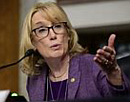 |
"I do not agree that 'gentlemen' in the Legislature should make decisions for me or any other woman" |
|
|
One of Bolduc's comments early on in the forum that "gentlemen" were capable of making legislative decisions about abortion rights drew a pointed response from Hassan.
"I do not agree with (Bolduc) that 'gentlemen' in the New Hampshire Legislature should make decisions for me or any other woman," Hassan said.
(Update Nov. 15, 2022: New Hampshire Democratic incumbent Sen. Maggie Hassan defeated Republican challenger John Bolduc Nov. 9)
In Ohio, Democratic Rep. Tim Ryan (District 13) and his challenger, Republican J.D. Vance--nominees for Ohio's U.S. Senate race--frequently sparred over the question of abortion in a wide-ranging debate hosted by WFMJ-TV on Oct. 17.
The two men are competing for the office of Rob Portman, who is retiring.
Redoubling comments he made recently to the Cincinnati Enquirer on abortion, Ryan condemned a recent proposal by U.S. Sen. Lindsey Graham to pass a national abortion ban.
Vance, Ryan charged, would back Graham's "latest attack on women's freedom."
Vance denied he was attacking women's rights, but said he considers himself Pro-life and would support "some minimum national standard."
In an interview last year with Columbus's Spectrum News 1, however, Vance was less measured. |
 |
"We want women to have choices, but above all we want young boys in the womb to have the right to life" |
|
|
"The (abortion) question ... to me, is about the baby," he said. "We want ... women to have choices, but above all, we want ... young boys in the womb to have the right to life."
Ryan himself has undergone significant changes in his point of view on abortion in his role as a lawmaker.
Describing himself as Pro-Life early on in his 10-year career, Ryan wrote in a 2015 editorial in the Akron Beacon-Journal that he had "come a long way since being a single, 26-year-old state senator (but now has) come to believe that we must trust women, not politicians, to make the best decision for their lives."
(Update Nov. 15, 2022: Republican J.D. Vance defeated Ohio's Democratic Rep. Tim Ryan on Nov. 8, after Ryan campaigned as a right-to-center Democrat with little affection for his own party)
|
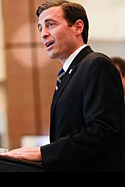 |
"Roe v. Wade was always a joke" |
|
|
"Roe v. Wade was always a joke," declared former Nevada Attorney General Adam Laxalt in a public address Oct. 25. Laxalt, a Republican, is running against Democratic incumbent Catherine Cortez Masto in a race for the U.S. Senate.
Laxalt has been endorsed by former President Donald Trump, and, among other positions, supports securing the U.S.-Mexico border. He considers himself Pro-Life, but acknowledges Nevada's existing abortion laws are still preeminent.
"The people of Nevada have already voted to make abortion rights legal in our state," he said the day the U.S Supreme Court overturned Roe v. Wade, "and the court's decision on Roe doesn't change settled law."
Laxalt lamented the same laws, however, when he told a convocation of Christian pastors on June 6, "We have to be honest ... We are not a pro-life state--and we've got work to do on that." (Reported in the Nevada Independent.)
To Masto, a former criminal prosecutor who went on to be elected Nevada Attorney General in 2006, Roe v. Wade is not a joking matter.
|
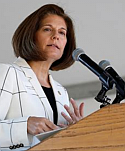 |
"Some politicians today once again declare that they know what's best for every family in this nation" " |
|
|
Speaking on the Senate floor Sept. 24, Masto asserted that "some politicians today ... once again declare that they know what's best for every family in this nation ... even though voters in my state voted to protect the right to choose that Nevada women have had for fifty years."
Masto is the first Latina Senator in U.S. history and the first woman to serve Nevada in the Senate.
(Update Nov. 15, 2022: Nevada's Catherine Cortez Masto on Nov. 12 defeated her Republican challenger, Adam Laxalt, in a closely-watched race that handed Democrats continued control over the U.S. Senate)
In Pennsylvania, Rep. Todd Stephens (District 151),
a Pro-Choice Republican who's been in office 12 years and has enjoyed bipartisan support from both his fellow legislators and voters alike, after public backlash over the U.S. Supreme Court overturned Roe v. Wade, is now finding public perception of his party is more negative than his own record.
One of Stephens's door-hanger campaign leaflets reads Stephens is working to ensure "women make their own healthcare decisions," but a growing lack of enthusiasm from both Republicans and Democrats has him striving to retain the support he once enjoyed. |
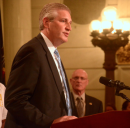 |
"I vote my district, not my party" |
|
|
"I vote my district, not my party," Stephens told Politico in a recent interview, but those close to the race say the long-time legislator's moderation may not be enough.
His challenger, state legislative aide Melissa Cerrato, dismisses Stephens as "passive," saying that only a Democratic win in the state will preserve Pennsylvania's current abortion rights.
And representatives of a Planned Parenthood PAC in Pennsylvania--which backed Stephens in 2018 and 2020--recently announced the group will now support Democrat Cerrato.
(Update Nov. 20, 2022: Republican incumbent Rep. Todd Stephens (Pennsylvania 151st District), a long-time Pro-Choice state lawmaker, has conceded his race to Democratic challenger Melissa Cerrato, giving state House Democrats a majority after 12 years of Republican dominance. Cerrato won by 58 votes.)
Stephens's Democratic House colleague, Rep. Jordan Harris (District 186), had weighed in on the threat to abortion rights in Pennsylvania when first hearing the U.S. Supreme Court had overturned Roe in June.
"Today's #SCOTUS decision is devastating," Harris wrote on Twitter on June 24. "But remember - abortion access is still legal in Pennsylvania. It's still safe in Pennsylvania. But we must fight like hell to ensure it stays that way." |
 |
"Abortion access is still legal in Pennsylvania.
But we must fight like hell to ensure it stays that way." |
|
|
In Arizona, Blake Masters, a Republican challenging Arizona U.S. Sen. Mark Kelly, hardly shares Stephens's support of abortion rights, although Masters has indicated he'd be in favor of exceptions.
“I think at the federal level, we should not be ... allowing abortion ... except to save the life of the mother," Masters said Oct. 6 in a debate with Kelly sponsored by Phoenix's PBS affiliate. But comments by Blake in other venues have led some campaign observers to claim the candidate is far more radical than his PBS statements showed.
In a YouTube broadcast in September, Masters characterized abortion proponents as aligned with dark forces. |
 |
"Abortion ... is a religious sacrifice to these people--it's demonic" |
|
|
'Yeah, it's a religious sacrifice to these people," Masters claimed in a segment reported on by Arizona's Northeast Valley News and Phoenix's Channel 12. "I think it's demonic."
Kelly, the husband of former U.S. House Rep. Gabby Giffords (Arizona District 8) shot back at Masters, stating what he thinks the current reality is for women with the U.S. Supreme Court's repeal of Roe v. Wade. |
 |
"Arizona women have totally lost the right to make a decision about abortion" |
|
|
"Arizona women have totally lost the right to make a decision about abortion," Kelly declared. "It's devastating. It's wrong. And it's exactly what my opponent, Blake Masters, wants."
(Update Nov. 15, 2022: Arizona Democratic incumbent Mark Kelly defeated challenger Blake Masters Nov. 11, as called by the Associated Press)
No discussion of how politicians' policy positions can shift, or, as some say, "evolve" over time would be complete without mentioning the career of Tulsi Gabbard.
When the former Democratic U.S.
House Representative from Hawaii (District 2) announced last month she was leaving the Democratic Party, calling it "an elitist cabal ... of war mongers," observers were gob-smacked. Where had the liberal progressive Gabbard they knew just four years prior gone? |
 |
"The Democratic Party is an elitist cabal of war-mongers" |
|
|
Now a frequent guest on Fox News and a comfortable foil to host Tucker Carlson, Gabbard once espoused progressive social causes, and when
elected to the U.S. House of Representatives in 2012, quickly advanced into the upper echelons of the national party.
Once in Congress, Gabbard supported same-sex marriage, abortion rights, the Green New Deal,
a $15 minimum wage, Medicare-for-all, and endorsed Vermont Sen. Bernie Sanders in his former run for president.
Gabbard began her political career at age 21 when she was elected to Hawaii's House of Representatives (District 42) as a Democrat, and identified as a Democrat until last month.
During her time in office in Hawaii, however, Gabbard worked with local organizations opposed to same sex marriage--and even civil unions for gay people--and worked to pass a constitutional amendment prohibiting same-sex marriage, in alignment with her politician father's own virulently anti-gay position.
Gabbard was the first Hindu to be elected to the U.S. Congress, and saw military service in the Middle East as a member of the American National Guard. Her anti-regime-change stance brought her into a highly publicized conflict with the foreign policies of former President Barack Obama, who had endorsed her in her run for the House.
After her participation as a candidate among other Democrats in the run-up to the 2020 U.S. presidential election, Gabbard eventually dropped out, and endorsed President Joe Biden, but is now his strident critic.
In another apparent u-turn, during her time in Congress Gabbard introduced a bill to ban abortions after five months of pregnancy, but added, "Abortion should (still) be safe, legal, and rare." Then a more thoroughgoing shift occurred in her position when, in late May this year, a U.S. Supreme Court document was leaked indicating the Court would likely overrule the nearly 50-year old statute Roe v. Wade.
"The very real possibility of Roe v. Wade being overturned terrifies me," Gabbard declared on a questionnaire published by Vote Smart before the 2020 election. But another reversal was in the offing.
Gabbard defended the high court's decision some weeks later, and presently is campaigning for Michigan's Republican gubernatorial candidate Tudor Dixon, who is pushing for abortion bans with no exceptions for rape or incest.
(Update Nov. 15, 2022: Democratic incumbent Gretchen Whitmer handily defeated Trump-backed Republican Tudor Dixon in Michigan's governor's race Nov. 10)
Gabbard's transformation into a proponent of the far right now seems complete: She recently spoke at a CPAC conference in Florida, has signed with the right-wing site Rumble to do video commentaries, and also is campaigning for New Hampshire's Trump-endorsed GOP senatorial candidate and retired Army Brigadier General Don Bolduc in his run against Democrat incumbent Maggie Hassan.
Those who know her well wonder where Gabbard's policy stances will eventually codify. And after the starts and stops, ambiguity, and reversals, one close observer of her career seeing her form new conservative alliances opined, "Somebody asked me the other day if Tulsi had taken a crazy pill.
"She doesn't need a pill." |
And then there was Texas. . .
|
|
Ann Richards once quipped, "I've always said that in politics, your enemies can't hurt you, but your friends will kill you." (If anyone reading this section about Texas doesn't know who Ann Richards is, we at Noticias Southwest will pray for you.)
If our investigation has shown us anything, it's that there is probably no statement more apt than Richards's to describe the political reality today in Texas--especially as regards the abortion debate. |
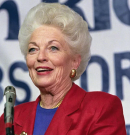 |
"I've always said that in politics, your enemies can't hurt you, but your friends will kill you" |
|
|
Back in the day, during the youth of the World War II generation, Texas was solidly Democrat, in part because you had to be a member of the party to vote for Sheriff.
Over the next couple of decades, as the older generation moved further right and the younger left, the dependably Democratic Texas began its long, tortuous schism into two warring parties.
As the sixties developed, the liberal journalist Ronnie Dugger, then editor of the University of Texas's Daily Texan newspaper, predicted that, under the pressure of greater political progressivism, mainstream Texas Democrats would soon be flocking to the Republican party in droves.
Former Texas Governor John Connally and his cohort and friend Lyndon Johnson, party leaders in the 50's, 60's, and 70's, went their separate ways, Connally over to the conservative GOP, Johnson into a position as U.S. president to enact progressive causes--many espoused by his predecessor John F. Kennedy--that made major changes in U S domestic policy. (Many in Texas's political left at the time criticized the pragmatic Johnson's evolution, saying he had abandoned the state's progressive wing; but Johnson toward the end of his life answered by telling detractors to judge him by his long record of liberal achievements.)
Those heady times have long since passed; and today, deeply-reflecting Texans who have loved their state with a passion almost of a paramour--this writer among them--Texas is nearly unrecognizable, awash in virulent, confused partisan skirmishes.
With more and more diverse, liberalizing urban centers, increasingly trenchant conservative, evangelical rural areas and small towns, and minority rule by non-negotiating lawmakers in Austin, some wonder what Texas's future holds--or even if there is one.
Texas Republicans today enjoy almost impenetrable solidarity and through it have gained nearly complete control over statewide legislation, prompting the Dallas Morning News recently to dub Texas "the most conservative one-party state in America."
Under GOP rule, the state also implemented the most restrictive abortion law in the country with the enactment of its "Heartbeat Law," Texas Senate Bill 8 (SB-8).
After the U.S. Supreme Court annulled Roe v. Wade last June, Texas Attorney General Ken Paxton in July issued a policy letter announcing the state's "trigger law" would became effective August 25, fully enacting SB 8. (As predicted, the law currently is being challenged by lawsuits claiming it violates provisions of the state's Constitution.)
Banning almost all abortions in the state, SB-8 sets out criminal and civil penalties for abortion providers and allows exceptions for the life of the mother, but none for rape or incest.
Texas Democrats' lack of consensus
on the issue of abortion access and social and economic policies, however,
stands in dramatic contrast to Republicans' almost phalanx-like pivot to power, as recent events show.
On the eve of the most consequential election in the nation's history, Texas Democrats were fighting tooth and nail with . . .
Each other
The power of Texas's conservative political stamp is so prodigious that its engagement with national Democratic leadership has led to unheralded equivocation and policy reversals.
Two no less powerful leaders
than U.S. Speaker of the House Nancy Pelosi, along with her cohort Rep. Jim Clyburn (D-South Carolina), recently threw their full endorsement weight behind conservative anti-abortion Democrat Rep. Henry Cuellar in his June race for south Texas's District 28 against challenger Jessica Cisneros, who ran a valiant race and nearly unseated the nine-term incumbent.
After a runoff, Cuellar ultimately won by only 289 votes, and those close to the election results lament his expected future negative vote could be an important factor contributing to the further erosion of abortion rights nationally.
Yet Pelosi, as late as last month during a nationwide campaign tour, could be heard declaring her party's ongoing commitment to abortion access.
It has yet to be explained by anyone how Pelosi, a woman and a liberal Democrat, and Clyburn, a man of color who surely knows that women in his demographic are more greatly impacted by reproductive issues, could have essentially thrown abortion under the bus. But similar ideological conflicts continue across Texas, in small towns, in big and mid-sized cities, and among Republican, Independent, and Democratic office-holders. And no matter what party or affiliation, there is much equivocation on the part of those in power.
Like the rest of us, politicians change--some over years, some in a sudden break with past loyalties.
Dugger in his early prediction about Texas's oncoming political shift was spot on--but the state's habitual struggle with race, gender, and progressive vs. conservative causes persists, warping long-held ideologies, pulling partisans both away from allies they once collaborated with, and toward co-options they never dreamed they'd champion.
This process was nowhere more apparent than at a bitter abortion battle July 5 that pitted El Paso Democratic Mayor Oscar Leeser against local women's advocates and eventually, powerful state interests.
The skirmish was over a proposal before the town's City Council to direct local law enforcement to deprioritize cases against women seeking abortions and block the collection of information about those accused.
The council's 4-4 tie vote--progressive representatives in favor of the measure, and other representatives aligned with largely conservative religious activists against it--ultimately was broken by Leeser, a life-long Democrat, who voted against the proposal.
Leeser's defection, and subsequent response to criticism that some regarded as cavalier, brought on a firestorm of protest from Texas's Democratic establishment. The protest came from the top.
"I (must) express my deep disappointment in your recent decision," Texas Democratic Party Chair Gilberto Hinojosa wrote in a July 13 open letter to Leeser. "You were asked as the Mayor of El Paso to direct law enforcement ... not to prosecute women who decide, for whatever reason, to get an abortion, and you refused."
|
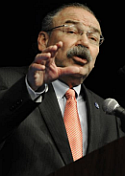 |
"I no longer support your tenure as Mayor of El Paso" |
|
|
Acting on a request by progressive local interests, the TDP last election cycle had endorsed Leeser in his run for mayor; and saw his July vote as a betrayal of the party and its values. Outraged, Hinojosa dropped the hammer.
"Given the decision that you have made on this critical and fundamental issue regarding a woman's freedom," Hinojosa concluded, "I no longer support your tenure as Mayor of El Paso."
For his part, in a statement to local affiliate KTSM, Leeser's answer to Hinojosa and his critics was studiously impassive:
"While it is always nice to receive an endorsement," Leeser said, "an endorsement should not obligate any individual to vote a particular way."
|
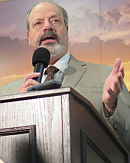 |
"It is nice to receive an endorsement, but an endorsement should not obligate any individual to vote a particular way" |
|
|
Besides, he remarked during the July 5 hearing, "El Paso is bound by federal and Texas law and my vote reflected that." And it was done.
It wasn't a good week for the chairman of the party, but Hinojosa knew the weeks to come, caucusing among other Texas Democrats, were shaping up to be worse.
Less than 10 days after his confrontation with El Paso's mayor, Hinojosa knew he would be facing stiff opposition in his campaign to retain his position as TDP chair during the party's annual meeting at Dallas's Kay Bailey Hutchison Convention Center last July 14-16. The lead-up to that meeting, that drew thousands of Texas Democrats to Dallas to debate the party's future prospects, had not been particularly convivial.
It would have been hard to imagine a more diverse slate of contenders for the Texas Democratic Party's chairmanship:
An Hispanic man, his party's leader for nearly 10 years, and a life-long proponent of progressive state politics; a female candidate, pledging to bring greater numbers of women into office; and an African-American contender with compelling economic ideas for reaching his community in burgeoning urban centers.
But as observers of the Democrats' July meeting's opening moments saw, that same diversity quickly devolved from one of strength and appeal to a congeries of competing, sometimes censorious, factions.
Party leaders for months prior to the Dallas assembly had argued over the best means of improving Democrats' representation in Austin state government.
One faction, the 134 PAC, championed by San Angelo Baptist attorney Jon Mark Hogg, and backed by candidate Kim Olson, proposed that greater attention and resources be committed to attracting rural Texans' votes.
Another, pushed by contender Carroll Robinson, chair of the Texas Coalition of Black Democrats, called for more emphasis on economic issues important to his urban county's demographic.
And interspersed throughout those contenders' proposals were frequent suggestions, even aspersions, that the long-serving current chair, South Texas's Gilberto Hinojosa, had not accomplished enough, had not moved the party into a position to better compete with Republicans. Hinojosa had an answer for them all.
"Everybody talks about rural Texas, and we love rural Texas," Hinojosa countered, "but the total percentage of votes coming out (of that group) was less than seven percent."
Robinson indicated his support for major Democratic outreach to a broad range of voters--both rural and urban.
"We have to pick up our fair share in rural Texas," Robinson declared, "(but) with a multi-racial coalition ... letting them know they are an important part." Hinojosa's response to Robinson drew audible gasps from the gallery.
"Carroll (has) been the chairman of the Coalition of Black Democrats for a number of years," Hinojosa answered. "But the last meeting, they had 12 members show up." The temperature of the convention, it seemed, had now gone up. But louder confrontations were in the offing.
After more lengthy commentary, the first round of votes for party chair came in--but there was a surprise. On the first ballot, no candidate had received a majority of votes: Hinojosa's tally was 45 percent, Olson's 37, and Robinson's 18--a legislative conundrum of sorts. And another unexpected turn ensued.
After the first round vote was announced, Robinson walked to the podium and spoke.
"I think Kim Olson is a great person," Robinson began, but said he was withdrawing from the race. "Those who have stood with me here and who came this far with me, want us to stand together with Gilberto Hinojosa."
And afterward, when the results of a second vote were announced--showing Hinojosa with 58 percent, Olson with 40--the convention floor erupted into both protest and praise.
Olson, a retired Air Force colonel who came to the meeting with the support of 70 Democratic county party chairs, was visibly disappointed, and told supporters she felt the outcome, and Robinson's seeming turn against her, was because she was a woman. The Dallas convention also was not the first time she had sparred with Hinojosa.
During her 2018 campaign for Agriculture Commissioner, Olson had helped organize a WomenWin conference in Killeen, Texas, and was reported to have come into major conflict with a party staffer there.
During a bus tour at an event honoring veterans, Olson reportedly became angry for not having been placed in a more prominent seat in accordance with her veteran's status, and was said to have pushed a ranking staffer, Crystal Perkins, who was trying to intervene, to the point that she fell down.
Olson denied the story, but Perkins, who was at first reticent, finally confirmed the altercation had happened.
When Hinojosa, who knew of Olson's plan to run for state chair, heard the story, he told reporters, "A Democratic nominee
... who assault(s) the Executive Director of the party, who is a woman, and verbally assault(s) a staffer, who is an Asian American woman, because of a seating arrangement at an event, has no business leading our Party." |
 |
"His speech makes one suspect that deals were made. And it makes women around here mad as hell" |
|
|
After the Dallas convention, Olson told Texas Monthly writer Michael Hardy that Robinson's speech “makes one suspect that deals were made. And it makes women around here mad as hell."
Robinson contradicted Olson, however, telling Hardy, "I didn't ask Gilberto for s---, and I don't want s---," saying he just was doing what his supporters told him they wanted.
Hinojosa teased out a win in Dallas, but Olson's supporters, a very vocal presence at the convention, claimed the TDP was continuing to play to the old guard.
"In the end, we couldn't get control of the party out of the grasp of South Texas," one leading Olson backer, who asked to speak anonymously to discuss volatile issues, told Noticias Southwest. "And it's going to hurt us, and the country, badly."
Thus tattered and chafing from the lack of camaraderie that could have warmed them, Texas Democrats departed Dallas in a plaintive diaspora to fight another day from distant strongholds--and to watch the midterm elections unfold.
As state policymakers labor to bring clarity to abortion rights issues, lawmakers in Texas's small towns and cities, most of whom describe themselves as Pro-life, are grappling with local developments dividing partisans--regardless of affiliation--and expending precious municipal resources.
New Home, Texas City Attorney Hunter Harris told Noticias Southwest earlier this year that the ordinance could weaken the U.S. Constitution and invite lawsuits; and Wayne Paul Frank, City Attorney for Omaha, Texas, warned that singling out one group could legally create a "slippery slope" to constrain others. In another vein, Wells, Texas City Attorney Robert Flournoy had also warned his client that the ordinance was "so poorly worded that it can invite lawsuits" and other legal challenges. (See related story in this issue, "What Small-Town Texas Lawyers Are Telling Their Clients About New Abortion Measures.")
But other potential litigants were not as moderated.
Former Big Spring, Texas Mayor Shannon Thomason on July 7 filed suit against the Whole Women's Health organization, its leadership, and well-known San Antonio physician Alan Braid and his daughter Andrea Gallegos, to block them from providing reproductive services, including abortion.
Filed in Howard County, Texas District Court, the suit names Amy Hagstrom Miller, Whole Women's Health founder; Marva Sadler, director of the group's Texas division; and Braid and his daughter as defendants. Noticias Southwest is following the development of the suit, and will file a report on it as details become available.
A request we made to former Mayor Thomason for comment has not been responded to.
Braid, a long-time Ob-Gyn specialist in San Antonio, Texas, made news in September of 2021 when he intentionally violated Texas's current abortion ban to protest Texas Senate Bill 8 by providing an abortion to a patient past six weeks of pregnancy.
A lawsuit was subsequently filed against Braid by a disbarred Arkansas attorney, Oscar Stilley, who is serving a Federal sentence for violation of tax laws.
Whole Women's Health is a national organization providing abortion and reproductive health care in several states, including Texas, but its Texas facilities were shut down after the repeal of Roe v. Wade and the passage of SB-8.
Thomason during his term as Big Spring mayor had been accused of electioneering and impersonating a city employee, was subject to recalls, and was regarded as a polarizing figure who frequently sought to bring more and more administrative power to himself and his office.
Thomason survived an August, 2020 recall effort, however, and went on to see his accusers marginalized.
A Pro-Life adherent, Thomason travelled to Abilene, Texas last January to support groups there working to outlaw abortion.
Big Spring itself was one of many small Texas towns to consider the Longview ordinance, but the town's City Council tabled the measure Dec. 10, 2019, when it deemed it "unenforceable" until the repeal of Roe v. Wade. The town went on to pass the ordinance in January 2020.
Thomason lost his bid for reelection May 7 to former 118th District Judge Robert Moore, who promised to bring more transparency and accessibility to the city in the administration of his office.
For Abilene Mayor Anthony Williams, it is not his Pro-Life allegiance that causes problems with out-of-town abortion and other issues--it is the issues' increased demands on his time as a civil servant and his small city's limited resources.
"Abilene was the first mid-sized city that put the ordinance on the docket," Williams recently told Noticias Southwest, "to let the citizens look at it and weigh in. So it's now on the ballot." He said his city's operation, however, is impacted from a different direction. |
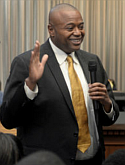 |
"City government is basically in place to provide services--potholes, water, solid waste, that sort of thing" |
|
|
"City government is basically in place to provide services," Williams said, "potholes, water, solid waste, that sort of thing." The Mayor noted recent national developments have compounded the challenges to governing faced by city administrators like himself.
"Nowadays, these wider issues complicate a city's role, such that we're no longer localized," he continued. "So something like immigration, for instance, in reality is a Federal issue." The Mayor said the
ever-more blurred line between national and local jurisdictions is often a source of confusion.
"These sorts of issues impact those of us in local positions who have to try to manage the ambiguity," he said. He added administrators like himself, with little allocated compensation, can find themselves overextended.
"I not only have a full-time job, I have a business," Williams said, "and as Mayor I make around a dollar a year.
For those of us who are small-town mayors whose jobs keep expanding, that can be pretty tough math."
Williams is Chief Diversity Officer at Abilene Christian University.
"It's poor people who are most impacted
by these harsh abortion
laws"
Like state and municipal lawmakers, some local community advocates have had their own individual struggles with abortion issues and their effect on the lives of everyday citizens.
"It's poor people who are most impacted by these harsh abortion
laws," Aurora Farthing, a former Republican activist in Lubbock, Texas, recently told Noticias Southwest.
Farthing said her own involvement in local politics drew her into community work for the disadvantaged and other needful groups in programs at her church, St. Christopher's Episcopal
Church, where her family have always been members.
She was influenced early on, she said, by the political philosophy of Ron Paul, and then later transitioned into involvement with Lubbock Area Republican Women, where she eventually advanced to become the group's president.
Farthing went on to serve on the Board of Trustees for All Saints Episcopal School, the Lubbock County General Assistance Advisory Board, and the Texas Advisory Council of the National Center for Missing and Exploited Children, and with her family continued to help Lubbock's homeless at St. Benedict's Mission.
Over time, as the Republican base moved into a hard right stance, Farthing said her values and goals shifted accordingly--especially as abortion issues gained local attention.
"As some of us tried to stave off the extreme abortion laws and other measures coming out of Austin and locally, we just kept hitting a wall of opposition," Farthing recalled.
She and other advocates worked against Lubbock's passage of an anti-abortion ordinance--the Sanctuary City for the Unborn ordinance--being promoted by Longview, Texas's Right to Life of East Texas, but the measure was passed by the city's voters on May 1, 2021. And Farthing and others also joined in resisting Texas's Senate Bill 8 (SB-8)--the state legislature's "Heartbeat Law" that went into full effect August 15 after the fall of Roe v. Wade.
Ultimately, these and other reversals of progressive causes pushed the long-time Republican leader and activist to a tipping point.
"I saw not only a war of men against women, but actual hatred--
against gays, other minorities, and disadvantaged groups"
"I got so tired of fighting the same fight over and over again, and losing every time," Farthing lamented. "And I finally knew what I had to do." She said her inability to stop, or at least weaken proposed abortion laws led her into a new perspective and springboard of activity.
"I looked at the group I was with and saw not only what looked like a war of men against women, but actual hatred--against women's rights, against gays, and other minorities and disadvantaged groups," she continued, "and I couldn't do it anymore. I resigned."
After leaving the Republican Party, Farthing continued working for social causes as an Independent.
With her new advocacy for abortion access, Farthing said she has been surprised to receive encouragement from former Republican allies.
"Some Republicans have come up to me and said privately, 'Thank you,'" Farthing said. "Something they couldn't say openly."
But with the annulment by the U.S. Supreme Court of Roe last June, the introduction of more and more restrictive abortion laws by the Texas legislature, and the erosion of social equity in the state, the once indefatigable champion of women's rights and the disadvantaged now says she's struggling to go on.
Born and raised in Lubbock as a part of traditional Texas Panhandle culture, Farthing proclaims herself a true Native Daughter--but recent social developments have her considering major, painful changes.
"It's hard to even express how heartbroken I am over
this slow descent into madness"
"I never thought I would leave this state," she said tearfully, but conceded a move for her and her family is in the offing.
Surveying the adversarial political climate across the country and in Texas, Farthing said she is hard put to understand the animosity that is now common among Americans.
"It's hard to even express how heartbroken I am over this slow descent into madness," she declared.
"When I think about it, my heart hurts. My heart has been shattered."
We end this, our long report, with the words of those greater than our ourselves--as a light to shine toward a better day.
The first is part of a sermon given in the 19th century by Unitarian minister Theodore Parker--containing words often quoted by the Rev. Martin Luther King, Abraham Lincoln, and others:
"I do not pretend to understand the moral universe; the arc is a long one, my eye reaches but little ways; I cannot calculate the curve and complete the figure by the experience of sight; I can divine it by conscience. And from what I see I am sure it bends towards justice."
The second comprises the sayings of Rabbi Hillel--Hillel the Elder--who was associated with the development of the Jewish Mishnah and Talmud, and lived and taught in the 110th century BCE:
"If I am only for myself, what am I? If not now, when?" mirroring the Jewish desideratum, "tikkun olam," that is, "repairing the world."
It was Rabbi Hillel's words that were paraphrased in our own era by many leaders, including the late Robert F. Kennedy, who often recited the phrase during his civil rights work:
"If not us, who? If not now, when?"
|
|


